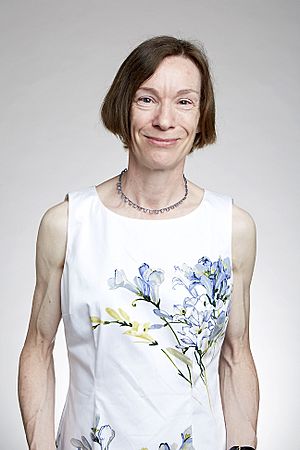Anne Ridley facts for kids
Quick facts for kids
Anne Ridley
FRS FRSB FMedSci FRMS
|
|
|---|---|

Ridley in 2017
|
|
| Born |
Anne Jacqueline Ridley
1963 (age 62–63) |
| Alma mater | University of Cambridge University of London |
| Awards |
|
| Scientific career | |
| Fields |
|
| Institutions |
|
| Thesis | Mechanisms of oncogene action and interaction in Schwann cells (1989) |
| Doctoral advisor | Hartmut Land |
Anne Jacqueline Ridley, born in 1963, is a British scientist who studies cells. She is a professor of Cell Biology and leads a department at the University of Bristol. Before this, she was a professor at King's College London.
Her Early Studies
Anne Ridley went to Cambridge University and studied science. She focused on biochemistry, which is about the chemistry of living things. This was in 1985. A scientist named Tim Hunt encouraged her to become a researcher.
She then went to the University of London. In 1989, she earned her PhD, which is a very high university degree. Her research looked at how certain genes, called oncogenes, work in special cells called Schwann cells. This important work was done at the Imperial Cancer Research Fund.
Her Science Career
Anne Ridley started her career as a postdoctoral researcher. This means she continued her research after getting her PhD. She worked at the Whitehead Institute in Massachusetts, USA, from 1989 to 1990. Then, she worked at the Institute of Cancer Research in London from 1990 to 1993.
From 1993 to 2007, she led a research group at the Ludwig Institute for Cancer Research. This institute is part of UCL. She also became a Professor of Cell Biology at UCL from 2003 to 2007.
Since 2007, she has been a Professor at King's College London. Her research has greatly helped us understand cancer and how it spreads. She also studies inflammation, which is how our body reacts to injury or infection. She does this by studying how cells move and how they communicate using special proteins called Rho GTPases.
Her work has influenced many areas of medical science. This includes understanding how metastasis (cancer spreading) happens. It also helps with cardiovascular disease (heart and blood vessel problems) and infections. Her research has received funding from important groups like Cancer Research UK.
Awards and Special Honours
Anne Ridley has received many awards for her scientific work. In 2017, she was chosen as a Fellow of the Royal Society (FRS). This is a very high honour for scientists in the UK.
She also received the Robert Hooke Medal in 2000. In 2002, she became an EMBO Member. She won the Liliane Bettencourt Prize for the Life Sciences in 2004. She was also made a Fellow of the Royal Society of Biology (FRSB) in 2009. In 2012, she became a Fellow of the Academy of Medical Sciences (FMedSci). In 2014, she was made an honorary fellow of the Royal Microscopical Society (FRMS).
 | Roy Wilkins |
 | John Lewis |
 | Linda Carol Brown |

